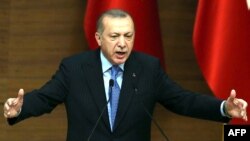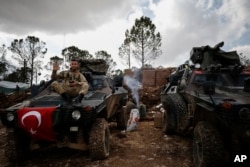Turkey has reacted furiously to the European Parliament’s motion calling for an end to Ankara's military offensive in Syria's Afrin enclave against a Kurdish militia. The motion cited concerns for the hundreds of thousands of civilians trapped in Afrin city under siege by Turkish forces for almost two months. But beyond the diplomatic haranguing, both the European Union and Ankara appear anxious to continue to work to rebuild relations.
Speaking at his presidential palace, Turkish President Recep Tayyip Erdogan addressed local representatives from across the country and contemptuously dismissed the European Parliament motion.
“Don’t get your hopes up. We will only leave Afrin once our work is done,” Erdogan said. “Hey, European Parliament, what are you doing? You should be honest. There is nothing the European Parliament can tell us on this. Your statement will go in one ear and out the other. What burden have you shared with us in hosting 3.5 million Syrians?”
The call comes amid rising humanitarian worries for the hundreds of thousands of civilians trapped in Afrin city. “Since midnight, 18 civilians, including five children, were killed by Turkish artillery fire in the city of Afrin,” the Syrian Observatory for Human Rights stated Friday. Ankara strenuously denies any civilians have been killed since the start of its operation, despite its wide use of artillery and airstrikes. Turkish planes dropped leaflets on Afrin this week, calling for civilians to leave the city and not to be allowed to be used as human shields.
‘No turning back’
There is little expectation the European Parliament motion will have any effect on Ankara. “There is no turning back for this operation,” said political columnist Semih Idiz of the al-Monitor website. "The government has invested too much in the operation, whatever the international pressure.”
Other Turkish observers have gone further to suggest the non-binding motion was merely political cover for European politicians. “The move [European Parliament motion] amounted to killing two birds with one stone for the EU leadership, as Turkey-bashing for public opinion was combined with unblocking a major aid package to Turkey to moderate relations at the diplomatic level,” wrote Murat Yetkin, editor of the Hurriyet Daily News.
Earlier this week the EU Commission, in the face of strong political and public criticism from some quarters in Europe, allocated 3 billion euros to Turkey as part of refugee deal with Ankara. Under the deal, signed two years ago, Ankara has committed itself to stemming the flow of migrants into the European Union. The agreement has seen numbers dramatically fall from hundreds of thousands per month to a few hundred.
Ankara views the refugee deal as one of the most important tools of leverage with Europe, particularly Austria and Germany, which are strong critics of the Turkish government. Earlier this week German Chancellor Angela Merkel spoke with Erdogan. According to Turkish media reports, the refugee deal and security cooperation were discussed.
Such leverage will be important in the forthcoming EU summit with Erdogan this month in Bulgaria. Ankara is looking for visa-free travel for its citizens traveling to EU countries, along with a recognition of a custom union.
Beholden to none
“[The] EU is a community that requires consensus or qualified majority to make decisions and it's not there for Turkey,” said analyst Atilla Yesilada of Global Source Partners. “There is this unspoken consensus across the EU, 'yes, it’s nice to talk to the Turks, but if they want something concrete they will have to comply with the Copenhagen criteria, otherwise no deal.'”
The Copenhagen criteria are the human rights standards that countries seeking to join the EU have to comply with in order to make the grade. Ankara’s ongoing crackdown following the 2016 failed coup — resulting in tens of thousands of detentions, including over a hundred journalists — has been strongly criticized by Brussels. But in a move interpreted as a gesture to the EU, several prominent journalists recently were released from jail. This is a process that reportedly is expected to continue as Ankara seeks to improve relations with the EU.
At the same time, Ankara continues to deepen relations with Moscow. The two countries, along with Iran, are cooperating, ostensibly to resolve the Syrian war. Foreign ministers from all three nations met in Astana, Kazakhstan, ahead of a planned summit to be held in Istanbul next month to discuss Syria. Observers say such cooperation carries an implicit message to its western allies that Turkey is a country beholden to no one.






